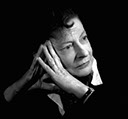
Phyllis on her music
Phyllis Tate wrote this for a radio broadcast to celebrate her 65th birthday.
My early efforts at composition, round about the age of fourteen, were mostly foxtrots and blues. I wrote both the music and the words, which I crooned in a sort of husky whisper, accompanying myself on the ukulele - I toured with a concert party and at one of our entertainments, for some reason, a professor of composition happened to be in the audience. After the show he suggested that it might be a good idea for me to have some harmony lessons and learn something about classical music. Rather unwillingly I began a thoroughly formal training at one of London’s larger musical institutions. Now this was not all that long ago, and yet I remember a marvellously evocative sentence from a textbook that I was given there, probably still in use, which said ‘However, when we turn to modern music such as Chopin…’. However, I did learn a great deal under this old-fashioned regime and I’m all in favour of a solid grounding. I feel that every composer should at least be able to harmonise a hymn tune, or arrange, in a conventional way, a folk song for SATB. Anyway, nearly all the music - and there was a lot of it - that I wrote for the next ten years I burnt, and I really started up again in the mid-1940s.
This programme is of comparatively recent pieces, and I wonder how much I have changed during the last 25 years. Like most composers, I suppose that I have become more economic; probably less brainy too. In fact, I am amazed at the mental stamina I used to have, and how I managed to write such complicated stuff with such a complex manipulation of ideas. Over the years my music has become much more simple. Writing for schools has greatly contributed to this pruning, and I find it a real challenge as it is essential to write music that is straightforward and communicative, but also, at the same time, to introduce the unexpected twist within the restrictions. Actually, it’s quite difficult to write easy music, as every note has got to be just the right note. All this, on a slightly more ambitious scale, has influenced my writing for adults. What I’m aiming for is a sort of simple unpredictability. This is what I admire in two of my favourite composers, Berlioz and Janacek, so often straightforward outwardly and yet so odd and surprising. Put it another way, I might suggest that my music isn’t quite as simple as it sounds. On the other hand, if it happens to make some sort of instant impact, then I am very pleased.
Words are a great prop to the composer. At least, I find them so, and all the works in this programme, with one exception, involve voice or voices. I find that word-setting eases the somewhat painful and often laborious task of writing down and marshalling hundreds of notes. With purely instrumental music you have to rely solely on your own resources - be your own architect in fact; but a poem helps to create its own structure. Although I’m not preoccupied with any particular period of poetry, Victorian verse does seem to have got a hold on me. I’ve set ‘The Lady of Shalott’ for tenor, two pianos plus percussion, and on a different level, my opera ‘The Lodger’ which is based on the Jack the Ripper murders of the 1880s. In ‘A Victorian Garland’, the first work in this programme, for soprano, contralto, horn and piano, it was works by Matthew Arnold that fired me. In my ignorance, I had always imagined Arnold to be a somewhat stern figure, side-whiskered and looking disapprovingly down on the wicked world; and the title of the first song, ‘Morality’, might seem to bear this out. However, further acquaintance completely did away with this idea, and I found myself really entranced by the imagery and humanity of these poems. In this cycle I have used the words as a kind of silhouette, and have tried to reflect in today’s musical terms their different moods.
Royal Academy certificate
A woman composer in a man's world
Phyllis at work
Copyright www.phyllis-tate.com - All rights are reserved. Admin email: admin@phyllis-tate.com